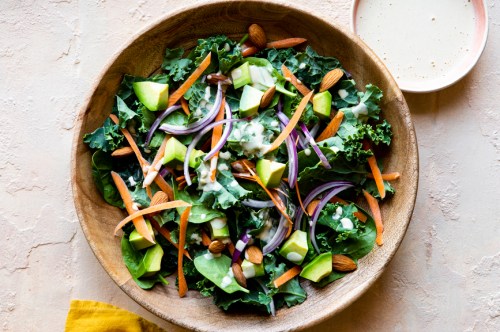Is Increased Fiber Curing Your Constipation or Causing It? Here’s Exactly How To Tell
Eating fiber is long regarded as the solution to constipation, but tbh it can actually cause it if you're eating too much of it.

Like cold brew, dollar oysters, and back-to-back episodes of Survivor—too much of a good thing can be, uh, bad. Some things are worse than others, but unfortunately, fiber consumption is on this list. Often considered a digestive hero (and it is), consuming fiber can help support healthy blood sugar levels and add substance to your stool—but having too much can, in fact, back you up. Below, registered dietitians explain what fiber does, how to know when you’ve had enough, and what to do if you’re experiencing a digestive traffic jam.
Experts in This Article
registered dietitian nutritionist specializing in holistic nutrition and gut health
board-certified gastroenterologist and hepatologist at Manhattan Gastroenterology
What is fiber, and why do we need it
Before we get into what happens when you’ve had too much fiber, let’s discuss the basics. “Fiber is one type of non-digestible carbohydrate, meaning humans lack the enzymes to break down fiber from food. For this reason, fiber has a lot of importance to our gut,” says Olivia Ashton Brant, MS, RD, CSSD, a dietician who specializes in gut health.
There are two kinds of fiber: soluble and insoluble. Soluble fiber dissolves in water and other liquids, turning into a gel that “acts as a sponge to absorb substances as it travels” through your digestive tract, Brant explains. It’s in apples, beans, chia seeds, and oats. On food labels, it is often referred to as tapioca, psyllium, and guar gum, she says.
Insoluble fiber is found mainly in whole grains and cruciferous vegetables like broccoli, Brussels sprouts and kale. “Insoluble fiber speeds food through the intestine and goes undigested,” Brant says. “Insoluble fiber may help keep you regular—it adds mass and triggers motility to ease constipation,” Brant says.
Most balanced meals will contain a combination of both fiber types, and your body needs them to balance your digestion, bulk up your stool, and stabilize your blood sugar. Fiber also helps you feel fuller, longer. So when you couple fiber with water and other beverages, you can keep constipation at bay.
However, “either kind of fiber can cause constipation if you consume more than the daily recommended amount,” says Jenna Volpe, RDN, LD, CLT, registered dietitian-nutritionist.
Here’s why too much fiber can cause constipation
Let’s be clear: Either type of fiber can help with constipation—so you shouldn’t avoid it. Still, Volpe says you need to make sure you’re drinking enough hydrating fluids. Healthy bowel movements need lubricated intestinal walls so that things can move smoothly through and out of the body. When you consume fiber without properly hydrating, it can become a dense, slow-moving “block” of waste in your colon.
Additionally, Volpe says a high-fiber diet will add bulk to your stool, which is good. Bulky stools move more easily through your digestive system (think: the opposite of loose stool). However, if there’s too much bulk, your stool can get stuck, move slowly, and generally cause constipation. Too much fiber increases the “volume of poop in the gut beyond what our body is designed to process,” Volpe says.
How much fiber does a person need
Most healthy adult women need 25-28 grams per day, and men should aim for 31-34 grams each day, according to the USDA’s dietary guidelines. The best way to get the right amount of fiber naturally is to eat various fruits and veggies each day, choose mostly whole grains, and incorporate nuts/seeds, beans, and legumes in moderation if tolerated.
Everyone’s dietary needs may vary, and the types of fiber that work for some people may not work as well for others. It’s always important to listen to your body and reduce or increase based on your body. Additionally, if you struggle with certain irritable bowel disease types, you may even be advised to follow a low fiber diet, Volpe says. It’s always important to check with a doctor or a registered dietitian if GI symptoms disrupt your daily life or persist despite your best efforts.
Oh hi! You look like someone who loves free workouts, discounts for cutting-edge wellness brands, and exclusive Well+Good content. Sign up for Well+, our online community of wellness insiders, and unlock your rewards instantly.
Sign Up for Our Daily Newsletter
Get all the latest in wellness, trends, food, fitness, beauty, and more delivered right to your inbox.
Got it, you've been added to our email list.










